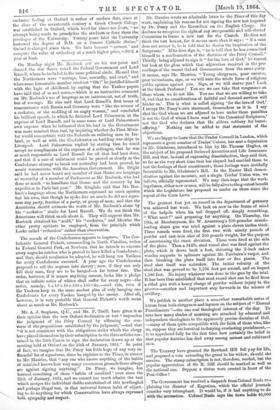Mr. A. J. Stephens, Q.C., and Mr. F. Traill, have
given it as their opinion that the new Oxford declaration or test " impeaches the judgment of the Privy Council by affirming the con- verse of the propositions established by the judgment,"—and that "it is not consistent with the obligations under which the clergy have placed themselves by their subscription to the three articles con- tained in the 36th Canon to sign the declaration drawn up at the meeting held at Oxford on the 25th of January, 1864." In point of fact, we imagine that Dr. Pusey has little hope of any very in- fluential list of signatures, since he explains to the Times, in answer to Mr. Maurice, that " any one who knows anything of the habits of mankind knows how very many concurrent grounds there always are against signing anything." Dr. Pusey, we imagine, has learned something of these "habits of mankind" even since the 25th of January, 1864, and we cannot too much admire the tact which merges the individual dislike entertained of this newfangled and perhaps illegal test, in that universal human habit of object- ing to do anything for which Conservatives have always expressed both sympathy and respect.


































 Previous page
Previous page